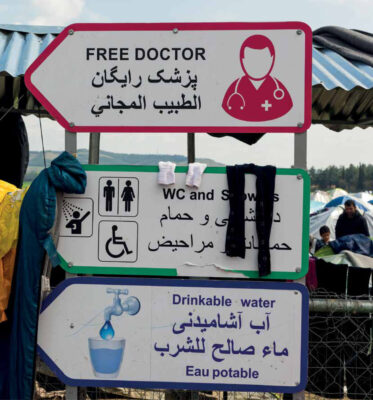Important notice
Please note that the images, figures, and tables for this Perspective have not been added yet. We are actively working to digitise and include these materials from our past magazines.
Main content
Interview with Bertha van Knippenberg-van den Berg
Amsterdam, 31 March 2015, Oudezijds Voorburgwal, red light district. After loudly ringing my bicycle bell to prevent the regular tourists from being run over, I carefully stop and lock up my bike and ring the doorbell at number 129. Before I know it I am witnessing an outpatient clinical consultation for a patient from Surinam with stomach complaints. An intern from the Academical Medical Centre is supervised by Bertha van Knippenberg-van den Berg, MD, making sure the patient gets the best possible care.
Can you tell us a bit about yourself? Who is Bertha van Knippenberg-van den Berg?
Years ago, I was working as a biochemical analyst in a University Laboratory and I noticed an internal drive to want to know everything about the human body. I wanted to be able to do exactly what all these doctors seemed to be doing: treat patients, and treat them well. After raising my children I finished my medical degree. I had the ambition to become a surgeon, but by that time I had become too old to specialize. I worked as a physician for infant health welfare (red.: known in Dutch as jeugdarts). After that I worked at the Bloodbank of a University hospital and later I became a coordinator of medical interns, something I still do within the Kruispost. In 2005 I read an article about the Kruispost, and a month later I was working as a GP and have been doing so for 2 days a week for over ten years.
What is Kruispost Amsterdam?
Stichting Kruispost started in 1983 and is a collaboration of the community of the Oudezijds 100 and the Johanniter Order. We are the medical department of the organization and our function is comparable to that of a General Practitioner. We offer medical and psychosocial care to those who, within the regular health care system, cannot find or are not given any help. We are open six days a week, with morning and evening office hours. Our care is focused on the homeless, the uninsured and rejected asylum seekers. Approximately 3,200 visitors seek our help on a yearly basis, which leads to at least 7,500 consultations a year. The figures of 2013 speak for themselves. Men between the age of 20 and 50 make up for the largest amount of our population and they mainly come from Brazil, the Philippines and Morocco. We mainly see gastrointestinal problems, vascular disease and dermatological problems. About 93% of our patients are uninsured and they regularly have a complicated medical, socio-economic and political background. Because of this we collaborate with psychosocial health care workers. There are a lot of psychological problems together with financial consequences. For example not being able to work and even homelessness. Our team is made up of 80 volunteers varying from receptionists and cleaners to General Practitioners, a surgeon, a neurologist, a dermatologist, a nurse practitioner in diabetic care, a physiotherapist, a dentist, a pharmacist, a social care worker, and a lawyer. Through lobbying, over the years we have been able to establish collaboration with Atal-medial with two departments willing to help us as diagnostic laboratory centres.
Very impressive, but what about funding?
Patients pay an amount per consultation, as much as they can. We rely heavily on donations, but do have some support from the government and health insurances. Our great strength lies in the fact that so many of us voluntarily contribute our time and try to provide the best of care, sometimes with the bare minimum. A challenge in which help is always welcome.
Define Migrant Health within Kruispost Amsterdam.
Helping patients, and not only medically, with the most hopeless situations originating from their cultural, social, economic or political status. I have seen that this is only possible with collaboration and a great deal of medical experience and skills and we are grateful to have so many experienced specialists contributing to that common goal.
What’s typical about working at the Kruispost?
Recently our former head coordinator, Hannie van der Wensch, MD, retired after 25 years. One main thing became clear after several lectures given by co-workers. At the Kruispost we have the time to see the patient in his or her full, broad cultural and socio-economic status. A consultation doesn’t necessarily have a time limit. We are able to do what many of us really want to do as a medical doctor. To have the time to treat the patient and not only the disease.
Greatest inspiration?
I don’t think I have one specific person or event that has greatly inspired me to do what I do. Looking back my personal drive to gain knowledge and do good with it and to teach has brought me to where I am today.
If you could say anything about migrant health, what would it be?
What becomes clear is that on the governmental level something is going wrong. Asylum seekers are being allowed to enter the country but without being given the opportunities to become active members of society. Needing to stay within asylum seekers centres, without chances of schooling, working, collaborating on projects. If I translated that situation to anyone’s life including mine it would cause great psychological dissatisfaction. And, well frankly,…make me depressed. Let alone if I were still carrying the problems that beset me in my country of origin, which might still have an impact on me and my children. We witness the lack of perspective, the hopelessness that comes forth out of this, and the vicious circle it creates. Don’t say yes, if you cannot offer any perspective.
A piece of advice to future tropical medical doctors?
Always try your best to give your patient the feeling that you are on equal levels.
In many countries being a doctor is having a certain status. You might be seen as superior which causes a barrier to speak freely and therefore make known what the exact problems are.
A patient is not just a complaint, or symptoms leading up to a disease but a human being, and a product of a cultural background and upbringing. Be determined to look for the problem, and not be pressured by time. The patient will tell you the answer to his problem, if you can take the time to listen and see it in his or her context.
IN DUTCH A
CONSULTATION
ROOM IS CALLED ‘A
SPEAKING ROOM’.
I THINK IT SHOULD BE
A LISTENING ROOM
INSTEAD
Note: For the annual report of 2013, see www.oudezijdsIoo.nl


















































